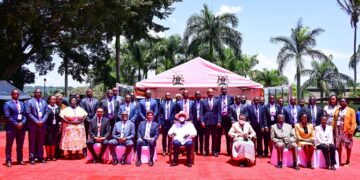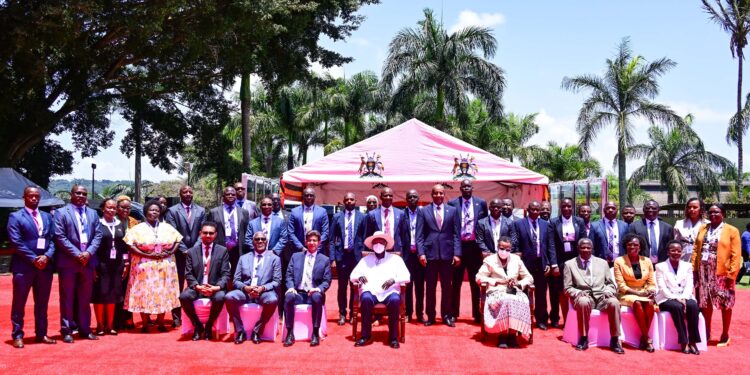President Yoweri Kaguta Museveni has underlined the pivotal role of development finance institutions (DFIs) in driving Africa’s transformation, calling on planners and financiers to strike a careful balance between infrastructure investment and projects that directly draw Ugandans into the money economy.
Speaking at the official opening of the first-ever Uganda Development Finance Summit at the Commonwealth Resort, Munyonyo, the President—accompanied by the First Lady and Minister of Education and Sports, Maama Janet Kataaha Museveni—warned against over-prioritizing infrastructure at the expense of production. The two-day summit, hosted by the Uganda Development Bank (UDB), gathered policymakers, development financiers, private sector leaders, and international partners to deliberate on how finance can accelerate Africa’s socio-economic transformation.
“Recently, we had to struggle with the Parish Development Model (PDM). We diverted money there to help villagers join the money economy. When they do that, production goes up, but you still have other demands like infrastructure. You can have a nice road, but with nothing to transport if there’s no production,” he said.

Museveni recalled that Uganda has maintained tarmac roads since the 1960s, yet poverty persists along them—proof, he argued, that capital must also flow into productivity-enhancing projects. He faulted early post-independence leaders for investing heavily in schools and health facilities while neglecting “the backbone of a capitalist economy”: electricity, railways, and affordable transport.
“All traffic and cargo are on a few roads. Rationally, rail should carry heavy cargo, pipelines should move fuel, and roads should serve passengers and light goods. But funding is always available for roads, never for rail or electricity,” he lamented, though he praised the EU’s support in rehabilitating Uganda’s standard gauge railway.
Why Uganda Needed UDB
Tracing back to the 1960s, the President said Uganda could not rely solely on private savings or foreign direct investment for industrialization.

“Your own people had no savings, and when they had money, they squandered it. Foreign investment was not coming. That is why I insisted on creating a Uganda Development Bank—an institution not chasing profit, but providing patient capital for agriculture, manufacturing, services like ICT and tourism, and artisanship,” he said.
He stressed that while wealth is generated individually, development is collective and requires state-backed financing. He further urged African countries to pursue regional market integration, warning that fragmented markets—like in Latin America—stifle growth despite resource wealth.
On value addition, Museveni cited coffee: “You produce a kilo for $2.5, but when processed into Nescafé it sells for $40. Who is the donor? You are the donor, but you don’t know,” he said, challenging financiers to support Africa in retaining value from its resources.

The President credited Chinese concessional financing for Uganda’s major hydro-power projects, noting that power costs have dropped to 2.8 cents per kilowatt hour at Karuma and could fall further once loans are cleared. “That is transformation. That is what development means,” he said.
Call for Vision and Integrity
Museveni argued that Africa’s transformation requires both vision and integrity. At independence, Uganda’s economy depended on “three Cs and three Ts—coffee, copper, cotton, tobacco, tourism, and tea—yet only 9% of households were in the money economy.” Leaders, he said, must “diagnose the disease and prescribe the cure,” which today means building savings, capital accumulation, and affordable credit.

He criticized commercial banks for “greed and dependency creation,” lending at 22% despite inflation below 5%. “At such rates, only quick import trade survives. Banks have become engines of dependence,” he said, insisting UDB is the sustainable solution to finance productive sectors.
Other Leaders Weigh In
Finance Minister Matia Kasaija noted that Africa is among the fastest-growing regions, with five of the world’s top ten economies in 2024 based on growth rates. Uganda grew at 6%, compared to a global average of 2.7%, and he projected GDP to rise from $50 billion in 2023 to $500 billion by 2040, driven by agro-industrialization, tourism, mineral development, oil and gas, and ICT.
UDB Managing Director Dr. Patricia Ojangole emphasized that development banks worldwide have propelled transformation, citing Asia and Brazil. She highlighted UDB’s role in directing over 80% of its credit to productive sectors—compared to commercial banks’ 45% to non-productive areas like real estate.

“With climate change, digital transformation, and shrinking fiscal space, national development banks must leverage innovative instruments like blended finance, digital infrastructure financing, and pipelines of bankable projects,” she said.
UDB Board Chairman Geoffrey T. Kihuguru added that development finance is key to addressing Africa’s overlapping crises—geopolitical shocks, disrupted value chains, and climate change—while creating jobs for a youthful population.
The summit was attended by Cabinet ministers, MPs, diplomats, heads of DFIs, civil society leaders, and private sector representatives.












